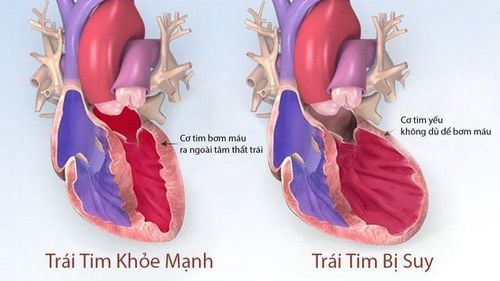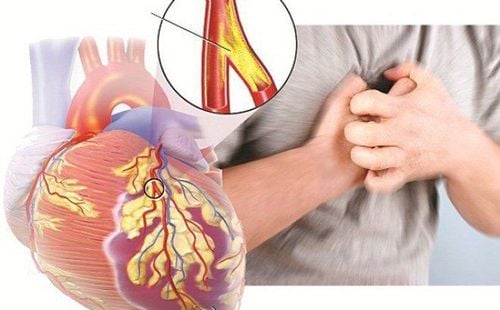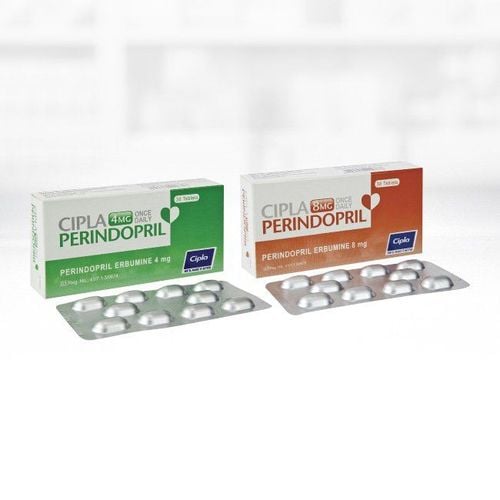This is an automatically translated article.
The article was professionally consulted by Specialist II, Senior Doctor Doan Du Dat - General Internal Medicine - Department of Medical Examination and Internal Medicine - Vinmec Ha Long International Hospital.Heart failure is often the final course of most cardiovascular diseases and can occur at any age, including young children. There is currently no cure for chronic heart failure, but treatment can slow its progression and limit complications. There are also some cases of acute heart failure after the cause of heart failure is resolved completely, and in the early stages, if properly treated, can lead a long and healthy life.

Suy tim ngày càng gia tăng, nhưng còn ít người biết
1. What is heart failure? How does the disease affect your life?
Heart failure is a medical condition in which the heart is weakened and cannot complete its normal function of pumping blood to the body (a workload compared to a normal person's heart and the efficiency of pumping blood away). nourishment of organs in the body is reduced).Patients with heart failure always face cardiovascular events.
Is heart failure dangerous? This is determined by the number of hospitalizations due to symptoms (complications) such as shortness of breath, cough, edema, fatigue, exhaustion. Patients gradually lose their ability to move, live and work, leading to a life-threatening decline in quality of life.
Heart failure is the result (consequence) of many diseases:
Usually there are 2 main causes:
Heart causes: Heart valve disease, cardiomyopathy, coronary artery disease, ... Non-cardiac causes: Hypertension, kidney failure, COPD, asthma, hyperthyroidism, ... We often see:
Pathology that damages the heart muscle, especially in people with diabetes, people who drink a lot of alcohol; Coronary heart disease causing myocardial infarction, common (especially) in smokers; Heart valve disease such as mitral regurgitation,... High blood pressure is not well treated; Congenital heart disease; Chronic heart failure, chronic kidney failure,...
2. Causes of heart failure
Damage to the heart muscle is the main cause of heart failure. Some of the following causes can cause damage to the heart muscle:Coronary artery disease: A disease that occurs when the arteries that supply blood to the heart are narrowed, due to atherosclerotic plaques or vasospasm, leading to to the heart is deprived of oxygen, causing angina pectoris ;

Suy tim do bệnh mạch vành.
3. How many levels of heart failure?
The degree of heart failure of the patient is assessed based on functional symptoms and exercise capacity, divided into 4 levels:Heart failure grade 1: Considered potential heart failure, the patient can still Physical activity and normal activities, no signs of shortness of breath, fatigue or chest pain. It is difficult to detect heart failure at this latent stage. Heart failure grade 2: Mild heart failure, when resting, the patient does not feel any symptoms, but when exercising, he notices shortness of breath, fatigue and palpitations. These signs may be transient or too mild for the patient to consider pathological. Heart failure grade 3: Moderate heart failure. At this stage, the patient is quite markedly restricted in movement and daily activities. At rest, the symptoms subside, but with strenuous exercise there is severe shortness of breath, gasping, fatigue, palpitations. The patient at this time began to feel anxious and went to the hospital for a checkup. For this reason, treatment usually begins in stage 3 of heart failure. Heart failure grade 4: Severe heart failure. The patient feels tired all the time, is almost unable to do any physical activity, daily activities become very difficult and can only do light tasks, shortness of breath. appear even at rest. Patients need to be hospitalized more often.
4. Signs of heart failure
There are often early manifestations such as fatigue, shortness of breath on exertion, or cough at night, especially when working quickly.Mild heart failure may not manifest as obvious symptoms. In the later stages, symptoms of heart failure may be persistent, frequent, or come on suddenly:
Shortness of breath. Edema and weight gain. Dizziness, fatigue and gradual exhaustion. Abnormally fast heart rate.
5. How to treat heart failure
First of all, to eliminate the cause of heart failure, it is necessary to reduce the burden on the heart. Patients with the above diseases need to be well treated to avoid the development of heart failure. Specifically, people with heart valve disease need to be detected early and treated appropriately, and operated at the right time. For people who already have high blood pressure, long-term treatment and stable blood pressure control are required. With coronary artery disease, it is necessary to be treated and monitored to avoid the risk of myocardial infarction.5.1. Using drugs The goal of treatment for chronic heart failure is not to cure it, but to control and relieve symptoms, to help patients prolong life and maximize quality of life. The use of drugs is aimed at this goal. Therefore, the drugs prescribed by the doctor are usually to stabilize blood pressure and control the pumping action of the heart by reducing the burden on the heart such as diuretics, vasodilators, increased contractility for the heart muscle, ...
Heart failure medications :
Heart failure patients will be treated with diuretics to help the body get rid of excess fluid in the body. In addition, the patient may be prescribed the following drugs:
An ACE inhibitor, or an Angiotensin II receptor blocker Di-goxin, a drug that helps the heart pump blood more efficiently Drugs that regulate the heart rhythm Patients need to absolutely follow the doctor's prescription, to avoid the situation of taking the medicine if it feels better, then stop continuing the treatment. In case heart failure patients experience side effects of the drug, it is necessary to immediately notify the treating doctor to reduce the dose or switch to another more suitable drug.
5.2. Suitable mode of living In fact, non-drug treatment plays an important role in improving heart failure. The doctor will prioritize discussing more about lifestyle changes to prevent the progression of heart failure with the following advice:
Gentle exercise, such as walking, yoga; Avoid excessive physical exertion; Quit smoking, don't drink alcohol; Manage stress, live optimistically and happily; Maintain a moderate weight; Eat healthy: Do not eat salty foods, add more green vegetables, fish, whole grains, drink enough water; Limit eating a lot of cholesterol (in animal fat, fatty dairy products); Monthly medical examination as directed by the doctor. Control related diseases: hypertension, diabetes, COPD, asthma, ... Besides, patients need to absolutely adhere to treatment, take the right medicine, at the right dose, at the right time. Do not arbitrarily reduce the dose or stop the drug, even if the symptoms disappear. Any change in treatment should be under the guidance of a cardiologist. Currently, Cardiovascular Center - Vinmec International General Hospital is one of the leading centers in the country for examination, diagnosis, screening and treatment of cardiovascular diseases. With the convergence of a team of experienced and reputable experts in the field of surgery, internal medicine, interventional cardiac catheterization and the application of advanced techniques in the diagnosis and treatment of diseases. Cardiovascular management, along with a system of modern equipment, on par with the most prestigious hospitals in the world such as: 3 Tesla MRI (Siemens), 640 CT machine (Toshiba), other equipment Advanced endoscope EVIS EXERA III (Olympus Japan), Avace advanced anesthesia system, Hybrid operating room according to international standards,... The Cardiovascular Center at Vinmec International General Hospital has achieved many achievements. successful and gained the trust of a large number of patients.
Please dial HOTLINE for more information or register for an appointment HERE. Download MyVinmec app to make appointments faster and to manage your bookings easily.













